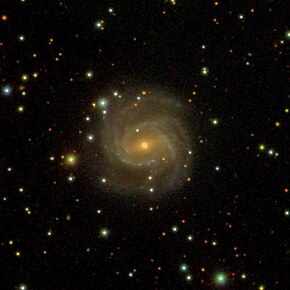NGC 7080 is a barred spiral galaxy[2] located about 204.5 million light-years away[3] in the constellation of Vulpecula.[4] It has an estimated diameter of about 100,000 light-years which would make it similar in size to the Milky Way.[3] NGC 7080 was discovered by astronomer Albert Marth on September 6, 1863.[5]
| NGC 7080 | |
|---|---|
 SDSS image of NGC 7080. | |
| Observation data (J2000 epoch) | |
| Constellation | Vulpecula |
| Right ascension | 21h 30m 01.9s[1] |
| Declination | 26° 43′ 04″[1] |
| Redshift | 0.016141[1] |
| Heliocentric radial velocity | 4,839 km/s[1] |
| Distance | 204.5 Mly |
| Apparent magnitude (V) | 12.3[1] |
| Characteristics | |
| Type | SB(r)b [1] |
| Size | ~104,384 ly (estimated) |
| Apparent size (V) | 1.8' x 1.7'[1] |
| Other designations | |
| CGCG 471-11, IRAS 21278+2629, MCG 4-50-12, NPM1G +26.0474, PGC 66861, UGC 11756[1] | |
According to Harold Corwin, NGC 7054 is a duplicate observation of NGC 7080.[6]
One supernova has been observed in NGC 7080: SN 1998ey (type Ic-pec, mag.16.8) was discovered by Ron Arbour on 5 December 1998.[7][8][9]
See also
editReferences
edit- ^ a b c d e f g h "NASA/IPAC Extragalactic Database". Results for NGC 7080. Retrieved 2017-07-22.
- ^ "Your NED Search Results". ned.ipac.caltech.edu. Retrieved 2017-07-23.
- ^ a b Zhou, Zhi-Min; Cao, Chen; Wu, Hong (15 November 2011). "Star Formation Properties in Barred Galaxies (SFB). II. NGC 2903 and NGC 7080". Research in Astronomy and Astrophysics. 12 (3): 235. arXiv:1111.3411. Bibcode:2012RAA....12..235Z. doi:10.1088/1674-4527/12/3/001. S2CID 119115076.
- ^ Rojas, Sebastián García. "Galaxy NGC 7080 - Galaxy in Vulpecula Constellation · Deep Sky Objects Browser". DSO Browser. Retrieved 2017-07-23.
- ^ "New General Catalog Objects: NGC 7050 - 7099". cseligman.com. Retrieved 2017-07-01.
- ^ "Notes on the NGC objects, particularly those missing, misidentified, or otherwise unusual (ngcnotes.all)". Historically-aware NGC/IC Positions and Notes. Retrieved 2019-08-10.
- ^ Arbour, R.; Schwartz, M. (1998). "Supernova 1998ey in NGC 7080". International Astronomical Union Circular (7065): 1. Bibcode:1998IAUC.7065....1S.
- ^ "Bright Supernovae - 1998". rochesterastronomy.org. Retrieved 2017-07-23.
- ^ "SN 1998ey". Transient Name Server. IAU. Retrieved 12 December 2024.
External links
editWikimedia Commons has media related to NGC 7080.
- NGC 7080 on WikiSky: DSS2, SDSS, GALEX, IRAS, Hydrogen α, X-Ray, Astrophoto, Sky Map, Articles and images